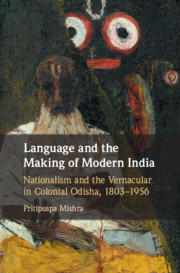
-
Select format
-
- Publisher:
- Cambridge University Press
- Publication date:
- January 2020
- January 2020
- ISBN:
- 9781108591263
- 9781108425735
- 9781108443319
- Creative Commons:
-
This content is Open Access and distributed under the terms of the Creative Commons Attribution licence CC-BY-NC 4.0.
https://creativecommons.org/creativelicenses - Dimensions:
- (228 x 152 mm)
- Weight & Pages:
- 0.5kg, 256 Pages
- Dimensions:
- (229 x 152 mm)
- Weight & Pages:
- 0.38kg, 260 Pages
Open AccessYou have access to this book
Book description
Through an examination of the creation of the first linguistically organized province in India, Odisha, Pritipuspa Mishra explores the ways regional languages came to serve as the most acceptable registers of difference in post-colonial India. She argues that rather than disrupting the rise and spread of All-India nationalism, regional linguistic nationalism enabled and deepened the reach of nationalism in provincial India. Yet this positive narrative of the resolution of Indian multilingualism ignores the cost of linguistic division. Examining the case of the Adivasis of Odisha, Mishra shows how regional languages in India have come to occupy a curiously hegemonic position. Her study pushes us to rethink our understanding of the vernacular in India as a powerless medium and acknowledges the institutional power of language, contributing to global debates about linguistic justice and the governance of multilingualism. This title is also available as Open Access.
Reviews
‘This sweeping study clarifies our understanding of the role of language and authority in the Indian nation through Odia speakers' use of literature, education, politics, and identity. Anyone interested in the intersection of language politics and culture, along with its ties to nation and territory, should read Mishra's book.'
Rosina Lozano - Princeton University, New Jersey
‘Intensely engaging, lucidly written and carefully drawn upon rich archival, historical and literary sources, Mishra presents a set of compelling arguments and theoretical insights while analysing the six decades of Odisha as a linguistic state formation. Language and the Making of Modern India shows how regional and national formations are not opposed but reproduce each other in multiple ways.'
Asha Sarangi - Jawaharlal Nehru University, New Delhi, India
‘Language and the Making of Modern India will be valuable to scholars of Indian vernacular politics, regionalism, nationalism, and citizenship. Mishra's is a pioneering study that shows how regional linguistic politics are crucial to understanding the history of citizenship in modern India, and how language became the crucial grounds for the constitution of the Indian national subject.'
Farina Mir - University of Michigan
Contents
Full book PDF-
Language and the Making of Modern India
pp i-ii -
-
- You have access
- Open access
- HTML
- Export citation
-
-
Copyright page
pp iv-iv -
-
- You have access
- Open access
- HTML
- Export citation
-
-
Dedication
pp v-vi -
-
- You have access
- Open access
- HTML
- Export citation
-
-
Contents
pp vii-vii -
-
- You have access
- Open access
- HTML
- Export citation
-
-
Maps
pp viii-viii -
-
- You have access
- Open access
- HTML
- Export citation
-
-
Acknowledgments
pp ix-xi -
-
- You have access
- Open access
- HTML
- Export citation
-
-
Additional material
pp xii-xii -
-
- You have access
- Open access
- HTML
- Export citation
-
-
Introduction
pp 1-30 - Nation in the Vernacular
-
-
- You have access
- Open access
- HTML
- Export citation
-
-
1 - How the Vernacular Became Regional
pp 31-75 -
-
- You have access
- Open access
- HTML
- Export citation
-
-
2 - Vernacular Publics: A Modern Odia Readership Imagined
pp 76-105 -
-
- You have access
- Open access
- HTML
- Export citation
-
-
3 - The Odia Political Subject and the Rise of the Odia Movement
pp 106-151 -
-
- You have access
- Open access
- HTML
- Export citation
-
-
4 - Odisha as Vernacular Homeland
pp 152-169 -
-
- You have access
- Open access
- HTML
- Export citation
-
-
5 - The Invisible Minority: History and the Problem of the Adivasi
pp 170-197 -
-
- You have access
- Open access
- HTML
- Export citation
-
-
6 - The Genius of India: Linguistic Difference, Regionalism, and the Indian Nation
pp 198-225 -
-
- You have access
- Open access
- HTML
- Export citation
-
-
Postscript
pp 226-232 -
-
- You have access
- Open access
- HTML
- Export citation
-
-
Bibliography
pp 233-243 -
-
- You have access
- Open access
- HTML
- Export citation
-
-
Index
pp 244-248 -
-
- You have access
- Open access
- HTML
- Export citation
-
Metrics
Altmetric attention score
Full text views
Full text views help Loading metrics...
Loading metrics...
* Views captured on Cambridge Core between #date#. This data will be updated every 24 hours.
Usage data cannot currently be displayed.
Accessibility standard: Unknown
Why this information is here
This section outlines the accessibility features of this content - including support for screen readers, full keyboard navigation and high-contrast display options. This may not be relevant for you.
Accessibility Information
Accessibility compliance for the PDF of this book is currently unknown and may be updated in the future.


